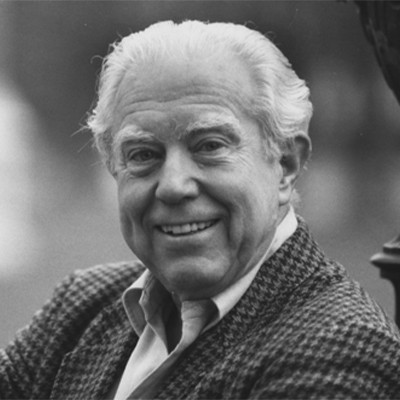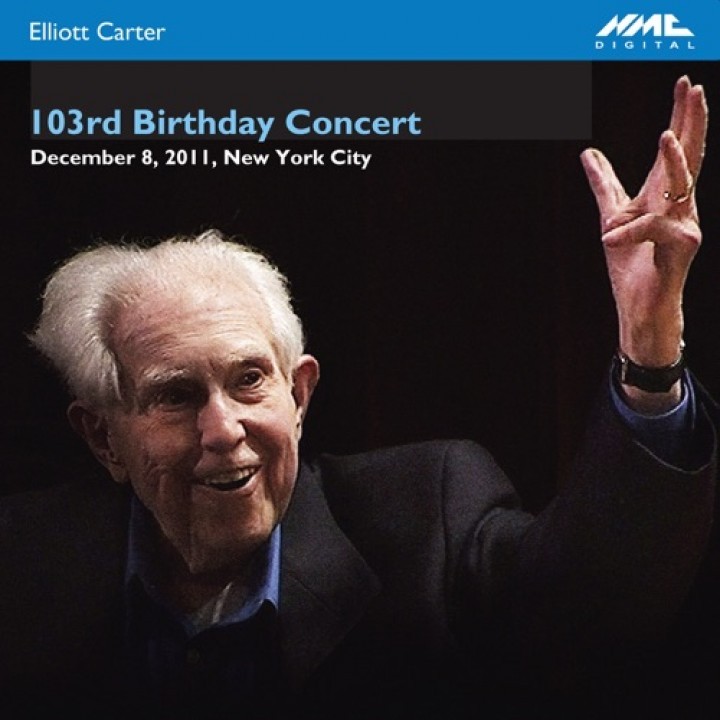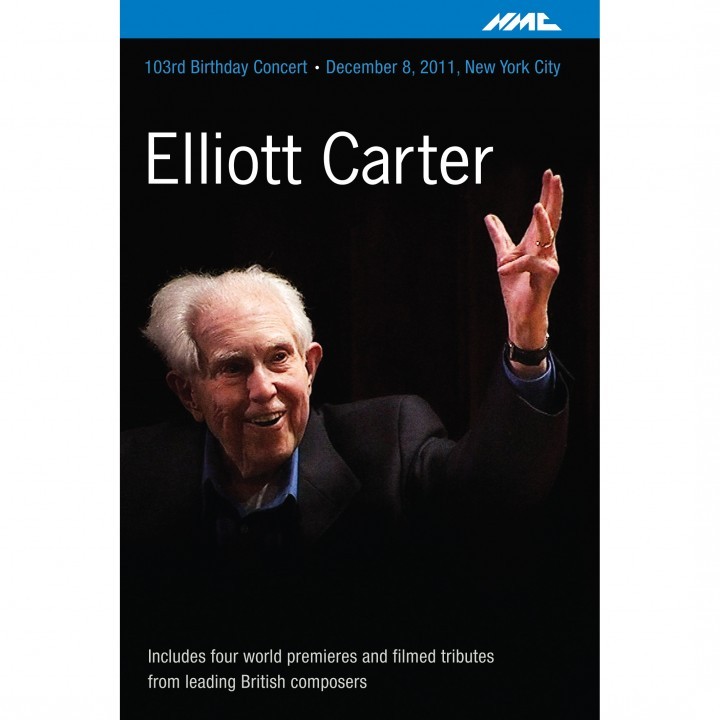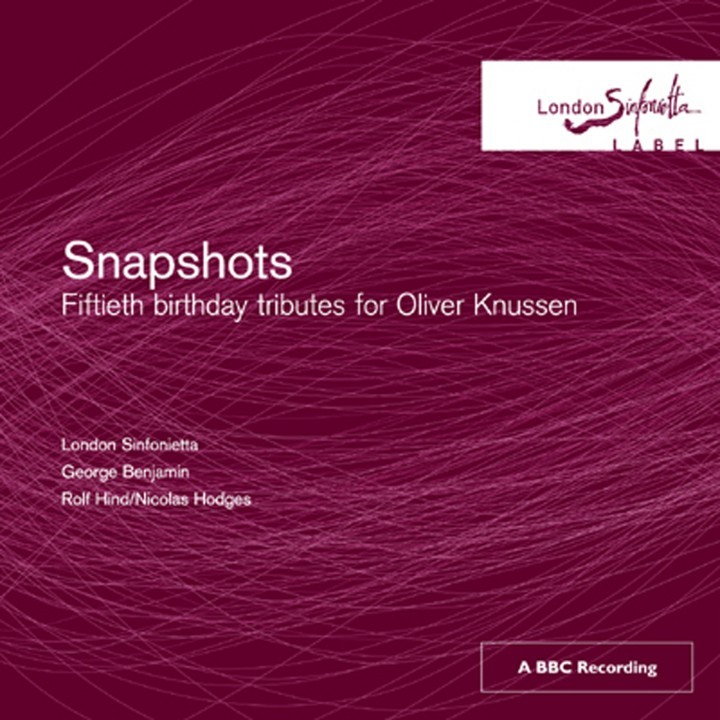Elliott Carter
Composer Elliott Carter is internationally recognized as one of the most influential American voices in classical music, and a leading figure of modernism in the 20th and 21st centuries. He was hailed as ‘America’s great musical poet’ by Andrew Porter and noted as ‘one of America’s most distinguished creative artists in any field’ by his friend Aaron Copland. Carter’s prolific career spanned over 75 years, with more than 150 pieces, ranging from chamber music to orchestral works to opera, often marked with a sense of wit and humour. He received numerous honours and accolades, including the Pulitzer Prize on two occasions: in 1960 for his second string quartet, and in 1973 for his third. Other awards include Germany’s Ernst Von Siemens Music Prize and the Prince Pierre Foundation Music Award. Carter was the first composer to receive the United States National Medal of Arts, and is one of a handful of composers inducted into the American Classical Music Hall of Fame. He was recognised twice by the Government of France: being named Commander of the Ordre des Arts et des Lettres, and receiving the insignia of Commander of the Légion d’honneur in September 2012.
Born in New York City on 11 December 1908, Carter was encouraged towards a career in classical music by his friend and mentor Charles Ives. He studied under composers Walter Piston and Gustav Holst while attending Harvard University, and later travelled to Paris, studying with Nadia Boulanger. Following his studies in France, he returned to New York and devoted his time to composing and teaching, holding posts over the years at St. John’s College, the Peabody Conservatory, Yale University, Cornell University and the Juilliard School, among others. Carter’s early works, such as his Symphony No. 1 (1942) and Holiday Overture (1944), are written in a neoclassical style, influenced by his contemporaries Copland, Hindemith and Stravinsky. After the Second World War, in works such as his Cello Sonata (1948) and String Quartet No. 1 (1950-51) he began to develop a signature rhythmic and harmonic language, which he continued to refine to the very end of his life. Igor Stravinsky hailed his Double Concerto for Harpsichord, Piano and Two Chamber Orchestras (1961) and Piano Concerto (1967) as ‘masterpieces’.
Carter wrote many pieces based on literature throughout his career, setting texts by acclaimed American poets such as John Ashbery, Elizabeth Bishop, E.E. Cummings, T.S. Eliot, Robert Frost, John Hollander, Robert Lowell, Marianne Moore, Ezra Pound,Wallace Stevens, William Carlos Williams and Louis Zukofsky. A creative burst of imagination began in earnest during the 1980s with works such as Night Fantasies (1980), Triple Duo (1982-83), Penthode (1985) and major orchestral essays such as his Oboe Concerto (1986–87), Three Occasions for Orchestra (1989), Violin Concerto (1990), and Symphonia: sum fluxae pretium spei (1993–96). Carter’s only opera, What Next? (1997–98), with a libretto by Paul Griffiths, was introduced by Daniel Barenboim, a champion of the composer’s music, in Berlin in 1999, and has since been produced at Tanglewood, in Munich, New York, Vienna, Melbourne, and Montpellier. Carter’s remarkable late career creative burst continued at an astonishing rate, encouraged by commissions from Pierre Boulez and the Ensemble Intercontemporain, Oliver Knussen and the BBC Symphony Orchestra, James Levine and the Boston Symphony, the Aldeburgh, Lucerne, and Tanglewood Festivals, and ensembles from Boston to Seattle, and London to Ljubljana.
Carter composed more than sixty works after the age of ninety, including his Cello Concerto (2000), Of Rewaking (2002), Dialogues (2003), Three Illusions for Orchestra (2004), Mosaic (2004) and In the Distances of Sleep (2006). In his final years, Carter continued to complete works with astounding frequency, including Interventions for piano and orchestra (2007), Flute Concerto (2008), What are Years (2009), Concertino for Bass Clarinet and Chamber Orchestra (2009), and The American Sublime (2011). Carter’s last completed orchestral work, Instances (2012), was premiered by the Seattle Symphony in February 2013. His final work, Epigrams (2012) for piano trio, was premiered at the Aldeburgh Festival in June 2013.
© 2013 John Link
By permission of Boosey & Hawkes
Composer Elliott Carter is internationally recognized as one of the most influential American voices in classical music, and a leading figure of modernism in the 20th and 21st centuries. He was hailed as ‘America’s great musical poet’ by Andrew Porter and noted as ‘one of America’s most distinguished creative artists in any field’ by his friend Aaron Copland. Carter’s prolific career spanned over 75 years, with more than 150 pieces, ranging from chamber music to orchestral works to opera, often marked with a sense of wit and humour. He received numerous honours and accolades, including the Pulitzer Prize on two occasions: in 1960 for his second string quartet, and in 1973 for his third. Other awards include Germany’s Ernst Von Siemens Music Prize and the Prince Pierre Foundation Music Award. Carter was the first composer to receive the United States National Medal of Arts, and is one of a handful of composers inducted into the American Classical Music Hall of Fame. He was recognised twice by the Government of France: being named Commander of the Ordre des Arts et des Lettres, and receiving the insignia of Commander of the Légion d’honneur in September 2012.
Born in New York City on 11 December 1908, Carter was encouraged towards a career in classical music by his friend and mentor Charles Ives. He studied under composers Walter Piston and Gustav Holst while attending Harvard University, and later travelled to Paris, studying with Nadia Boulanger. Following his studies in France, he returned to New York and devoted his time to composing and teaching, holding posts over the years at St. John’s College, the Peabody Conservatory, Yale University, Cornell University and the Juilliard School, among others. Carter’s early works, such as his Symphony No. 1 (1942) and Holiday Overture (1944), are written in a neoclassical style, influenced by his contemporaries Copland, Hindemith and Stravinsky. After the Second World War, in works such as his Cello Sonata (1948) and String Quartet No. 1 (1950-51) he began to develop a signature rhythmic and harmonic language, which he continued to refine to the very end of his life. Igor Stravinsky hailed his Double Concerto for Harpsichord, Piano and Two Chamber Orchestras (1961) and Piano Concerto (1967) as ‘masterpieces’.
Carter wrote many pieces based on literature throughout his career, setting texts by acclaimed American poets such as John Ashbery, Elizabeth Bishop, E.E. Cummings, T.S. Eliot, Robert Frost, John Hollander, Robert Lowell, Marianne Moore, Ezra Pound,Wallace Stevens, William Carlos Williams and Louis Zukofsky. A creative burst of imagination began in earnest during the 1980s with works such as Night Fantasies (1980), Triple Duo (1982-83), Penthode (1985) and major orchestral essays such as his Oboe Concerto (1986–87), Three Occasions for Orchestra (1989), Violin Concerto (1990), and Symphonia: sum fluxae pretium spei (1993–96). Carter’s only opera, What Next? (1997–98), with a libretto by Paul Griffiths, was introduced by Daniel Barenboim, a champion of the composer’s music, in Berlin in 1999, and has since been produced at Tanglewood, in Munich, New York, Vienna, Melbourne, and Montpellier. Carter’s remarkable late career creative burst continued at an astonishing rate, encouraged by commissions from Pierre Boulez and the Ensemble Intercontemporain, Oliver Knussen and the BBC Symphony Orchestra, James Levine and the Boston Symphony, the Aldeburgh, Lucerne, and Tanglewood Festivals, and ensembles from Boston to Seattle, and London to Ljubljana.
Carter composed more than sixty works after the age of ninety, including his Cello Concerto (2000), Of Rewaking (2002), Dialogues (2003), Three Illusions for Orchestra (2004), Mosaic (2004) and In the Distances of Sleep (2006). In his final years, Carter continued to complete works with astounding frequency, including Interventions for piano and orchestra (2007), Flute Concerto (2008), What are Years (2009), Concertino for Bass Clarinet and Chamber Orchestra (2009), and The American Sublime (2011). Carter’s last completed orchestral work, Instances (2012), was premiered by the Seattle Symphony in February 2013. His final work, Epigrams (2012) for piano trio, was premiered at the Aldeburgh Festival in June 2013.
© 2013 John Link
By permission of Boosey & Hawkes
Recordings by this composer
RecordingsCompilations with this composer
CompilationsRelated composers
Related composersExternal Links
Music Map
Discover more about the classical music of today with NMC's Music Map, and exciting and educational online tool which enables you to see and hear the connections between composers, their teachers, pupils, influences and their works.
Music Map



